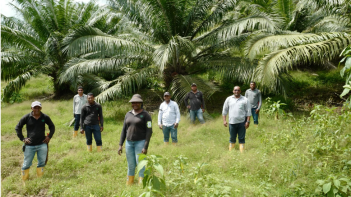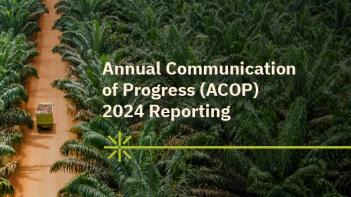In 2019, China imported 7.2 million tonnes of palm oil, making it the third-largest palm oil importer after India and the European Union. Palm oil is also the second most consumed vegetable oil in the country. However, compared to Europe and the United States, China is still in its infancy when it comes to promoting the use of certified sustainable palm oil (CSPO).
In line with its efforts to increase awareness and consumption of CSPO in China and transform the Chinese market through collaboration with Chinese government agencies, industry associations, and Chinese and foreign companies, RSPO has worked together with SynTao to carry out a situational analysis of palm oil in China – Strategy Report on China Sustainable Palm Oil.
Based on the data from various sources, interviews with stakeholders, and public consultations, the report analyses the current status of China's palm oil industry and the challenges that the country is facing in the development of sustainable palm oil, as well as providing suggestions for stakeholders along the supply chain.
The findings of the report were shared on 25 May during a webinar discussion hosted by RSPO and Syntao. Prominent stakeholders attended and gave input including the World Wide Fund for Nature (WWF), the Tropical Forest Alliance (TFA), HSBC, China Chamber of Commerce of Import & Export of Foodstuffs, Native Produce & Animal By-Products (CFNA), Foreign Economic Cooperation Office (FECO) of the Ministry of Ecology and Environment, China Certification and Accreditation Institute (CCAI) of State Administration for Market Regulation, CDP, GAR, WildBound and professor Qian from Tsinghua University.
RSPO Global Outreach and Engagement Director, Dan Strechay, opened the webinar with a welcome speech and said that research suggests that younger consumers, including those in China, do not want to contribute to negative environmental and social impacts, and they expect companies to do the right thing for them.
“Therefore, the pump is primed for companies to tap this increased desire for sustainability – now more than ever. The journey starts with the first step, often the hardest step. RSPO Credits could be a good opportunity and cost-effective way for corporates to communicate to consumers that they are making an effort to stop deforestation,” said Dan.
The Chief of Cereals and Oils Department of CFNA (China Chamber of Commerce for Import and Export of Foodstuffs, Native Produce and Animal By-Products), Chen Ying, agreed that it is important to pay attention to nature and sustainability, particularly after the COVID-19 pandemic. “We need to work closely together to push for sustainable palm oil and increase its awareness in China,” said Chen Ying.
Zhao Yang from FECO, echoed the same sentiment and encouraged the development of the palm oil industry with ecological resilience. He also suggested using natural capital accounting and promoting balanced development.
The General Manager of SynTao, Dr. Guo Peiyuan, took the opportunity to introduce Syntao's Corporate Social Responsibility (CSR) initiative, which also supports sustainability. He said that the strategy report is a good start, but it’s definitely not the final work. He explained the timeline and methodology of the development of the report, and provided an overview of global palm oil industries, as well as China’s palm oil value chain, challenges, and recommendations for sustainable palm oil.
RSPO China’s deputy representative, Wan Jian, summarised the strategy report and shared some of the China teams’ initiatives for promoting CSPO in China. She added that we also hope the new generation of consumers, who have more buying power and pay more attention to sustainability, will help drive the uptake of CSPO in the market, especially through initiatives like the ‘China Youth Programme’ introduced by Wildbound and RSPO.
To conclude the webinar, RSPO China’s representative, Teng Feifei said “We also expect companies to strengthen the construction of their incentive mechanisms and adopt a step-wise approach, such as purchasing RSPO Credits as a first step. ” Furthermore, based on the webinar, the participants all agreed that they need to join forces to raise public awareness of sustainable palm oil and formulate corresponding policies from NGOs and government agencies.
Keep reading

Call for Expression of Interest: Independent Investigation of a Complaint

Latin American Smallholders, Key Global Brands Gather in Peruvian Amazon to Advance Sustainable Palm Oil

RSPO Forum for Members and Certification Bodies 2025: Strengthening Capacities and Building Bridges with RSPO Members

From Violence to Prosperity: Cultivating Sustainable Palm Oil in San Pablo, Colombia

Palmas de Tumaco: Enduring, Trusting, and Transforming in Colombia’s Pacific Coast
Carry Over Credits for Certified Independent Smallholder Groups

From the Amazon to the Aisles: Discovering Sustainable Palm Oil in the Heart of Peru

Global Trends of Sustainable Palm Oil and China's Pathway




